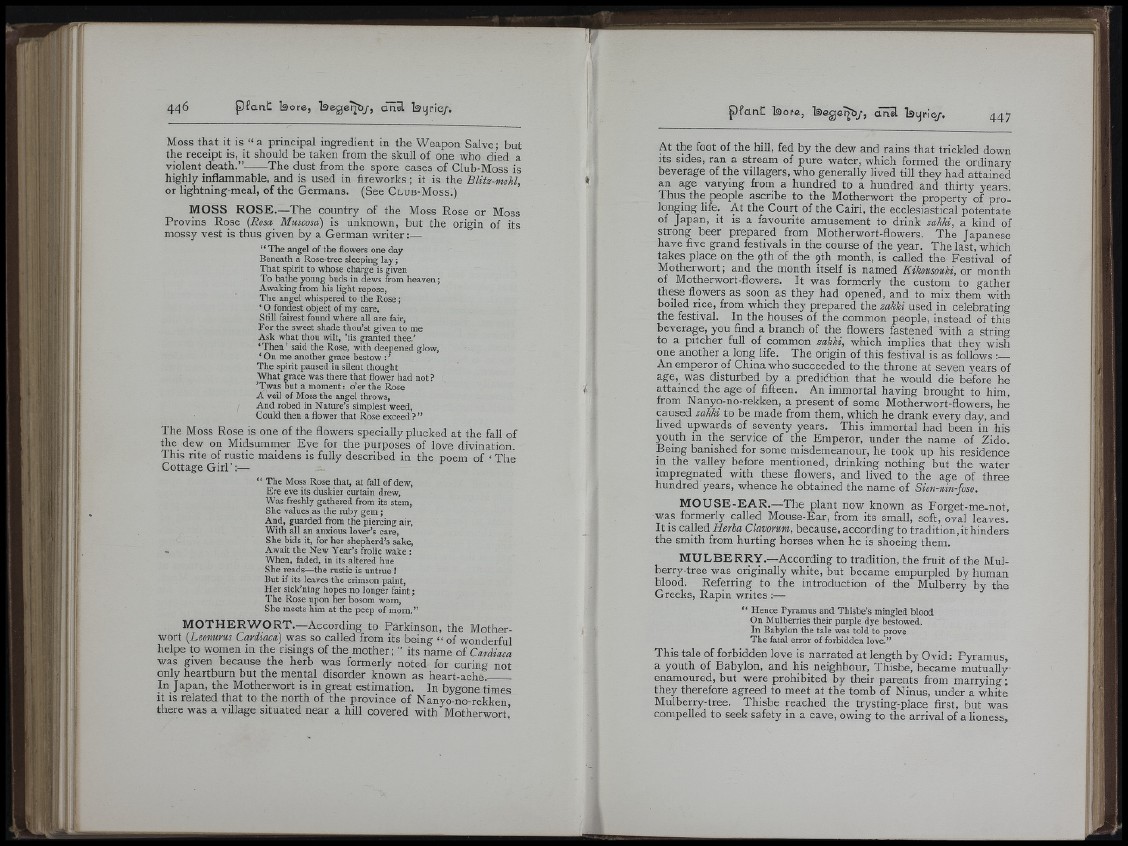
I I:
•4u. I
r :
• ; 1
J I I)
i. i
Moss that it is “ a principal ingredient in the Weapon Salve; but
the receipt is, it should be taken from the skull of one who died a
violent death.” The dust from the spore cases of Club-Moss is
highly inflammable, and is used in fireworks; it is the BUtz-meU,
or lightning-meal, of the Germans. (See C l u b -M o s s .)
M O S S R O S E .—The country of the Moss Rose or Moss
Provins Rose [Rosa Muscosa) is unknown, but the origin of its
mossy vest is thus given by a German writer:—
“ The angel of the flowers one day
Beneath a Rose-tree sleeping la y ;
That spirit to whose charge is given
To bathe young buds in dews from heaven;
Awaking from his light repose,
The angel whispered to the Rose;
‘ O fondest object of my care,
Still fairest found where all are fair,
For the sweet shade thou’st given to me
Ask what thou wilt, ’tis granted thee.’
‘ Then’ said the Rose, with deepened glow,
‘ On me another grace bestow : ’
The spirit paused in silent thought
What grace was there that flower had not?
’Twas but a moment: o’er the Rose
A veil of Moss the angel throws,
I And robed in Nature’s simplest weed,
Could then a flower that Rose exceed ? ”
The Moss Rose is one of the flowers specially plucked at the fall of
the dew on Midsummer E v e for the purposes of love divination.
This rite of rustic maidens is fully described in the poem of ‘ The
Cottage Girl ’ :—
“ The Moss Rose that, at fall of dew,
Ere eve its duskier curtain drew,
Was freshly gathered from its stem,
She values as the ruby gem;
And, guarded from the piercing air.
With all an anxious lover’s care,
She bids it, for her shepherd’s sake,
Await the New Year’s frolic wake :
When, faded, in its altered hue
She reads—the rustic is untrue !
But if its leaves the crimson paint.
Her sick’ning hopes no longer faint;
The Rose upon her bosom worn,
She meets him at the peep of morn.”
M O T H E RW O R T .—According to Parkinson, the Motherwort
{Leomrus Cardiaca) was so called from its being “ of wonderful
helpe to women in the risings of the mother; ” its name of Cardiaca
was given because the herb was formerly noted for curing not
only heartburn but the mental disorder known as heart-ache.____
In Japan, the Motherwort is in great estimation. In bygone times
It IS related that to the north of the province of Nanyo-no-rekken,
there was a village situated near a hill covered with Motherwort!
At the foot of the hill, fed by the dew and rains that trickled down
Its sides, ran a stream of pure water, which formed the ordinary
beverage of the villagers, who generally lived till they had attained
an age varying from a hundred to a hundred and thirty years.
Thus the people ascribe to the Motherwort the property of prolonging
life. At the Court of the Cairi, the ecclesiastical potentate
of Japan, it is a favourite amusement to drink zahki, a kind of
strong beer prepared from Motherwort-flowers. The Japanese
have five grand festivals in the course of the year. The last, which
takes place on the 9th of the 9th month, is called the Festival of
Motherwort; and the month itself is named Kikousouki, or month
of Motherwort-flowers. It was formerly the custom to gather
these flowers as soon as they had opened, and to mix them with
boiled rice, from which they prepared the zakhi used in celebrating
the festival. In the houses of tlie common people, instead of this
beverage, you find a branch of the flowers fastened Mth a string
to a pitcher full of common zakhi, which implies that they wish
one another a long life. The origin of this festival is as follows
An emperor of China who succeeded to the throne at seven years of
age, was disturbed by a prediffiion that he would die before he
attained the age of fifteen. An immortal having brought to him,
from Nanyo-no-rekken, a present of some Motherwort-flowers, he
caused zakki to be made from them, which he drank every day, and
lived upwards of seventy years. This immortal had been in his
youth in the service of the Emperor, under the name of Zido.
Being banished for some misdemeanour, he took up his residence
in the valley before mentioned, drinking nothing but the water
impregnated with these flowers, and lived to the age of three
hundred years, whence he obtained the name of Sicn-nin-foso.
M O U S E -E A R .—The plant now known as Forget-me-not,
was formerly called Mouse-Ear, from its small, soft, oval leaves.
It is called Herba Clavorum, because, according to tradition, it hinders
the smith from hurting horses when he is shoeing them.
M U L B E R R Y .—According to tradition, the fruit of the Mulberry
tree was originally white, but became empurpled by human
blood. Referring to the introduction of the Mulberry by the
Greeks, Rapin writes :—
“ Hence Pyramus and Thisbe’s mingled blood
On Mulberries their purple dye bestowed.
In Babylon the tale was told to prove
The fatal error of forbidden love.”
This tale of forbidden love is narrated at length by Ovid: Pyramus,
a youth of Babylon, and his neighbour, Thisbe, became mutually
enamoured, but were prohibited by their parents from marrying;
they therefore agreed to meet at the tomb of Ninus, under a white
Mulberry-tree. Thisbe reached the trysting-place first, but was
compelled to seek safety in a cave, owing to the arrival of a lioness.
il ■'I i' Al
!
b
I' i ;